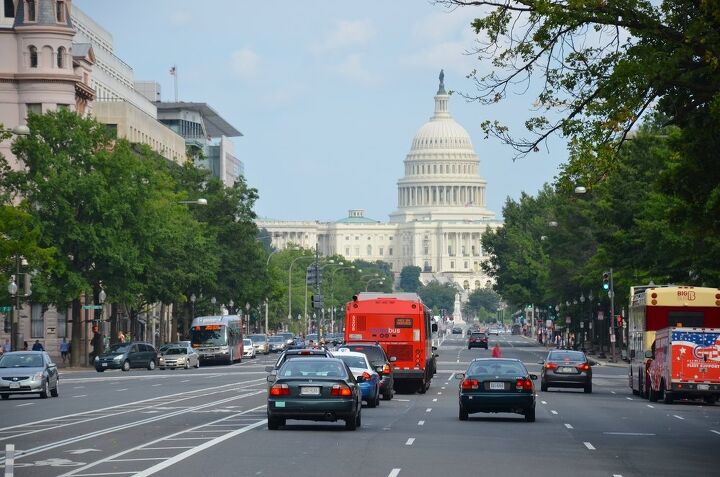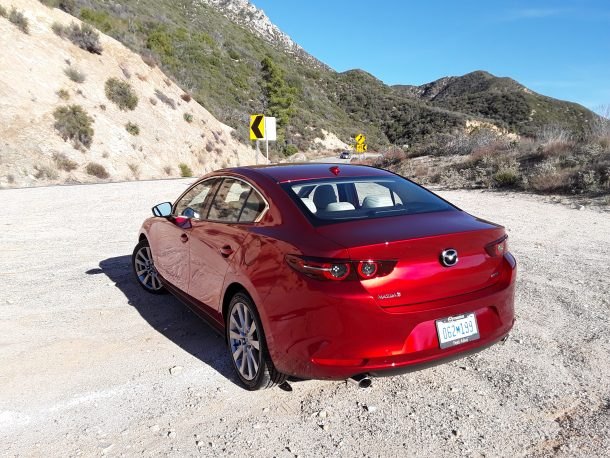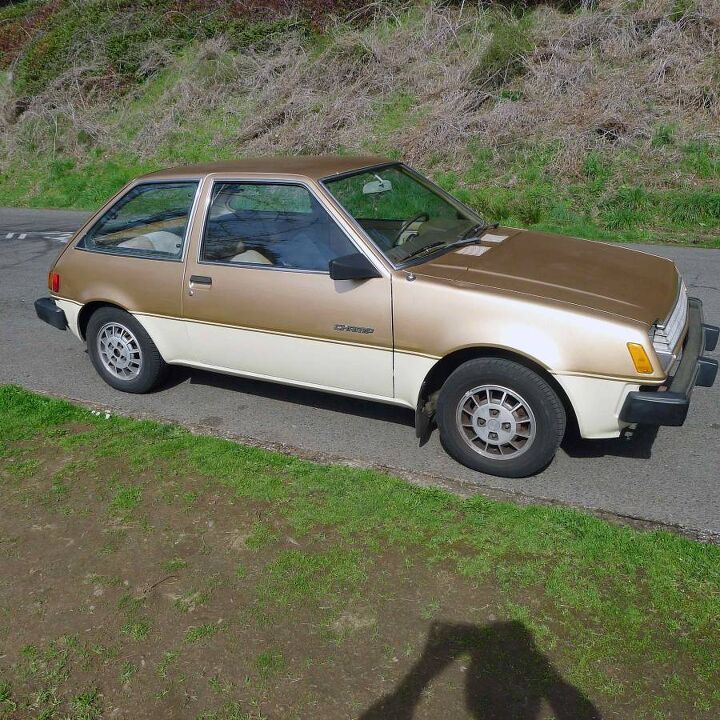#FuelEconomy
Gas War: Efficiency Rollback Would Raise Fuel Costs, Study Claims
The fuel economy rollback posited by the Trump administration remains a hotly debated issue within the automotive community. Unfortunately, it has become mired in political nonsense, making decrypting the real-world impact of embracing or shunning it rather difficult. Consumer Reports recently took a stab at making sense of the matter, coming out in favor of balking at the notion of a rollback on the grounds that it would ultimately raise fueling costs.
Last year, the administration proposed capping fuel economy and emission standards at 2020 levels, instead of allowing them to rise annually as under existing regulations. The opposition, fronted by California, is vying to maintain the existing standards — with the possible compromise of delaying them by one year.
Four Automakers Make a Deal With California Regarding Vehicle Emissions
While we’ve dinged the media for erroneously reporting that automakers were unilaterally “backing” California in the fuel-economy fracas that’s currently taking place within American politics, it appears four of them actually are starting to choose a side. However, this again requires a bunch of clarification. Despite not adhering fully to the state’s ideal emissions scenario, Ford Motor Co., BMW Group, Volkswagen Group, and Honda Motor Co. released a joint announcement stating they have reached a voluntary agreement with the state of California to adopt compromised vehicle emissions rules.
Since there’s nothing binding in the joint agreement and automakers make (and break) promises all the time, the deal is largely meaningless. Doubly so, since the fuel-economy rollbacks have yet to be finalized. But this does illustrate how a handful of manufacturers are willing to accommodate others in order to get a nationwide solution. It also shows a softening of California’s previously ironclad environmental stance, which is much more interesting.
Billion-dollar Lawsuit Accuses Ford of Falsifying Pickup Fuel Economy
As if preordained to coincide with Ford’s announcement of its electric F-Series prototype, news of a class-action lawsuit accusing the automaker of falsified fuel economy tests surfaced last night. The suit, filed on Monday in the U.S. District Court for the Eastern District of Michigan by Seattle law firm Hagens Berman, asks $1.2 billion in damages for customers it claims are overspending on fuel.
The legal action piggybacks on the Justice Department’s criminal investigation of Ford’s testing procedures for the 2019 Ford Ranger in April. However, the civil suit also ropes in the F-Series — claiming that customers could spend upwards of two grand in gas they never budgeted for.
Mild Misinformation About the Gas War: Governors Unite, Automakers Compromise
On Tuesday, 23 governors signed a joint statement urging the Trump administration to reconsider the proposed rollback of Obama-era fueling regulations. Led, unsurprisingly, by California Governor Gavin Newsom, the letter suggests a “common-sense approach” to national requirements with an emphasis on rising standards.
A minor update in the gas war to be certain — and yet annoyingly framed by a large portion of the media as a victory for California when the realities are far more complicated. To be frank, we’re getting pretty tired of these lopsided takes. This whole thing is a regulatory and political quagmire… on all sides.
EU Emission Fines Could Spell Trouble for Automakers in 2021, Especially VW and FCA
A recent study from consulting firm AlixPartners has suggested that automakers could be in for a financial ass kicking of epic proportions. As it turns out, reaching emission quotas is a difficult business and the European Union wants 95 grams of carbon dioxide per kilometer by 2021. The study suggests few automakers are on track to reach that goal and, as a result, will be forced to pay out sizable fines. We’re talking billions.
Can you guess which manufacturers are supposed to get hit the hardest?
Here’s a hint: we’ve discussed one of them having similar issues in the United States earlier this year and both of their names are in the title of this article.
Gas War Watch: Canada Sides With California
Canada’s federal government announced it has signed a memorandum of understanding with California to further reduce vehicle emissions. It would appear that the United States’ neighbor to the north has chosen a side in the gas war — at least spiritually.
Canadian Environment Minister Catherine McKenna, along with California Governor Gavin Newsom, announced the agreement’s signing on Wednesday.
“As the world’s fifth-largest economy and a global leader in clean transportation, California is a leading example of how climate action can be good for people, the environment and the economy,” McKenna said. “We look forward to working with California to fight climate change, keep the air clean and give drivers better options for cleaner, more affordable vehicles.”
Gas War Watch: EPA and CARB Leadership Won't Even Share the Same Table
Capitol Hill was the scene of some high-school drama this week after representatives from the Environmental Protection Agency (EPA) and the California Air Resources Board (CARB) reportedly refused to sit at the same table while discussing fueling regulations with the U.S. House Energy and Commerce Committee.
As petty as this seems, it illustrates the overall situation rather well. White House officials terminated talks with California in February, citing an inability to progress the debate. Meanwhile, CARB has been claiming the Trump administration doesn’t want to hear its case and has instead sought to strip the state of its ability to self regulate in order to pass reforms that would freeze national emissions standards at 2020 levels though 2026.
Thursday’s congressional bickering helped paint a clearer picture of what the communications breakdown looked like.
Gas War Watch: UAW Goes to Congress, Sides With Automakers on Fuel Economy Rollback
The United Auto Workers is spending Thursday telling Congress that the union opposes the Trump administration’s proposal to freeze fuel efficiency requirements at 2020 levels through 2026… sort of. While the UAW expressed moderate environmental concerns in the past, most of its opposition to the rollback has revolved around corporate investments into the industry. In fact, the union’s research arm called fuel economy the auto industry’s “future” in 2018.
This time around, the UAW seems to be singularly focused on business aspects. According to a prewritten testimony, UAW Legislative Director Josh Nassar intends to tell two subcommittees of the U.S. House Energy and Commerce Committee that the union is in line with automakers’ concerns about the proposal leading to “protracted litigation and uncertainty in the industry that will limit growth.”
The Great Gas War: House Committee Plans Hearing On Fuel Efficiency Rollback
On Tuesday, the House of Representatives Energy and Commerce Committee said it will schedule a hearing on June 20th regarding the Trump administration’s proposal to roll back automotive efficiency standards. The decision comes from Committee Chairman Frank Pallone, Jr. (D-NJ), Consumer Protection and Commerce Subcommittee Chair Jan Schakowsky (D-IL) and Environment and Climate Change Chairman Paul Tonko (D-NY) — all of whom are in clear opposition to the suggested plan.
The groups will hold a joint hearing to discuss Corporate Average Fuel Economy (CAFE) standards and carbon pollution regulations affecting light duty vehicles as they relate to the current administration’s plan to effectively freeze efficiency targets between 2020 to 2026.
Meet Us in the Middle: Automakers Plead for Peace, Compromise Between White House and California
The automotive industry is in turmoil. There’s an industrywide push toward electrification that has yet to prove itself as truly profitable, volume seems to be tapering off in the developed world, and emissions regulations aimed at improving air quality are operating counter to existing consumer tastes. As a result, automakers are scrambling to find the best path forward.
In 2017, that path involved encouraging the new U.S. president to roll back Obama-era fuel economy mandates, thus providing some breathing room and staving off fines as automakers began to realize they wouldn’t be able to meet tightening targets. The administration listened, leading to a proposal that would effectively freeze mileage standards at about 37 miles per gallon — rather than the previously decided 54.5 mpg — by 2025.
However, California and a coalition of supportive states claim they won’t be going along for the ride. This group says it will maintain the old standards, regardless of what the White House says. The staredown has automakers worried; they’ve now banded together to issue a letter asking both sides to calm down and keep talking.
Mazda Launches Skyactiv-X Engine in Europe, Fuel Economy and Power Revealed
Mazda fans on this side of the Atlantic will have to wait patiently for their turn, as the innovative Skyactiv-X-powered Mazda 3 now available in Europe won’t show up here for some time.
On Wednesday, the company announced that continental buyers can begin placing orders for models equipped with a Spark Plug Controlled Compression Ignition (SPCCI) 2.0-liter four-cylinder, tossing out fuel economy and power figures along the way.
Ditched Automatic Means MPG Boost for Hyundai Accent, Elantra
For the 2020 model year, Hyundai’s subcompact Accent and compact Elantra ditch their six-speed automatics in favor of a continuously variable unit — a move that’s not likely to elicit too many cries of protest.
Honestly, given the models’ modest torque figures, a traditional slushbox hardly amounts to motoring bliss, and drivers stand to gain faster manual shifts with a CVT. They also stand to gain a significant bump in fuel economy.
The Mazda CX-5 Diesel's Economic Case Is Nonexistent
Finally.
Mazda’s promised diesel-powered CX-5 is now open for pre-order in the United States, years after we began chronicling the Skyactiv-D’s lethargic march to North America.
TTAC’s coverage of Mazda diesel delays goes back nearly six years, when the future of Mazda’s Skyactiv-D was linked to a future Mazda 6. It was a story that received more attention in 2014. Eventually, in late 2016, there was confirmation of a Mazda CX-5 diesel. Arrival date: second half of 2017.
By the second half of 2017, however, the timing of the diesel CX-5’s arrival was unknown. Fast forward past a promising NHTSA filing, then a CARB certification, and then the release of EPA fuel economy ratings to the 2019 New York International Auto Show.
The Mazda CX-5 Signature AWD Diesel is ready, Mazda insists. But at $42,045, there’s simply no reason for its existence in America.
Rare Rides: A Beige Plymouth Champ - American Malaise From 1980
Rare Rides has featured a couple of Plymouths before, both of which were sporty and boasted two doors. Today’s Plymouth also has two doors, but is perhaps not quite as performance oriented as its brethren on these pages.
Hailing from 1980, it’s a super Malaisey Champ hatchback.
Volkswagen Arteon Continues Slow Track to U.S.; EPA Numbers Released
Revealed what seems like ages ago, Volkswagen’s upcoming flagship car will arrive in the U.S. as a 2019 model — halfway through 2019. Bearing the inelegant name Arteon, the new range-topper had its boat trip delayed by a new European test cycle that impacted the certification and release of numerous German vehicles.
It could be argued that, in the 13 months since the Arteon’s big reveal, consumer interest in midsize sedans — even ones with liftbacks — has eroded even further. No matter. VW’s going to give its CC replacement a shot. A sign of the Arteon’s impending arrival comes from just-released EPA fuel economy figures that won’t blow anyone’s minds.




























Recent Comments